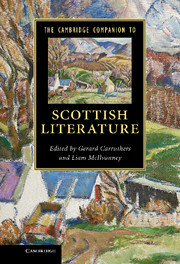Book contents
- Frontmatter
- Contents
- Notes on Contributors
- Acknowledgements
- Chronology
- Introduction
- 1 Scottish Literature before Scottish Literature
- 2 The Medieval Period
- 3 Reformation and Renaissance
- 4 The Aftermath of Union
- 5 Robert Burns
- 6 Enlightenment, Romanticism and the Scottish Canon
- 7 Scott and the Historical Novel
- 8 The Gaelic Tradition
- 9 Scottish Gothic
- 10 Victorian Scottish Literature
- 11 Robert Louis Stevenson
- 12 Hugh MacDiarmid and the Scottish Renaissance
- 13 Popular Fiction
- 14 Muriel Spark
- 15 The Glasgow Novel
- 16 ‘What is the language using us for?’
- 17 The Emergence of Scottish Studies
- 18 Otherworlds
- 19 Scottish Literature in Diaspora
- Index
- References
16 - ‘What is the language using us for?’
Modern Scottish Poetry
Published online by Cambridge University Press: 05 January 2013
- Frontmatter
- Contents
- Notes on Contributors
- Acknowledgements
- Chronology
- Introduction
- 1 Scottish Literature before Scottish Literature
- 2 The Medieval Period
- 3 Reformation and Renaissance
- 4 The Aftermath of Union
- 5 Robert Burns
- 6 Enlightenment, Romanticism and the Scottish Canon
- 7 Scott and the Historical Novel
- 8 The Gaelic Tradition
- 9 Scottish Gothic
- 10 Victorian Scottish Literature
- 11 Robert Louis Stevenson
- 12 Hugh MacDiarmid and the Scottish Renaissance
- 13 Popular Fiction
- 14 Muriel Spark
- 15 The Glasgow Novel
- 16 ‘What is the language using us for?’
- 17 The Emergence of Scottish Studies
- 18 Otherworlds
- 19 Scottish Literature in Diaspora
- Index
- References
Summary
Malcolm Mooney’s question, posed at the beginning of W. S. Graham’s late collection of verse, Implements in Their Places, articulates a concern shared by many modern Scottish poets. All poets are sensitive to the complexities of their medium, but in Scotland language itself has been ‘a question’ for centuries. As the great poets of the 1920s and 30s locked horns over the proper use of Scots, English or Gaelic, issues of patriotic loyalty became inextricably bound up with linguistic choices. While many applauded Hugh MacDiarmid’s resistance to what was often seen as the creeping, unavoidable incorporation of the Scottish languages into English, others debated Edwin Muir’s view that Scots had survived largely as a medium for unsophisticated kinds of writing and had little future as a serious literary language. The notion that a poet’s language was to be judged in terms of his national commitment, however, meant that the need to revive Scots and Gaelic was felt deeply – and widely. Graham’s query, presented as both a title and a refrain half a century later, is in part reflective of a sense shared with numerous writers of his generation that their art was somehow determined by their choice of language. It also anticipates, however, the response of many younger poets to the language question, which has been chary of absolute choices and tending instead towards more exploratory, interrogative, ironic or wittily tangential approaches. It is not that the question has been forgotten, but rather that the modes of address have been transformed for a newly devolved, twenty-first-century Scotland.
When Maurice Lindsay introduced his anthology of Modern Scottish Poetry in 1965, he emphasised the ‘variety of experience’ and ‘integrity of expression’ that distinguished the poems he had gathered, arguing that ‘these qualities, and not the question of which of Scotland’s three languages her writers choose to use, are what constitute the real Scottish Renaissance’. His very comment, however, reveals that in the 1960s it would generally seem strange to consider modern Scottish poetry without discussing the language question. Almost thirty years later, when Douglas Dunn turned his attention to editing another Faber collection, Twentieth-Century Scottish Poetry, he still found it necessary to address the implications of the linguistic choices represented in his anthology, observing somewhat drily that ‘Scottish poetry has been steeped in politics ever since MacDiarmid’s instigatory drum-beating back in the early 1920s.’
- Type
- Chapter
- Information
- The Cambridge Companion to Scottish Literature , pp. 233 - 247Publisher: Cambridge University PressPrint publication year: 2012

